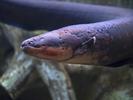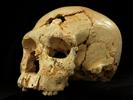Nell Greenfieldboyce appears in the following:
A Shocking Fish Tale Surprises Evolutionary Biologists
Thursday, June 26, 2014
How To Become A Neanderthal: Chew Before Thinking
Thursday, June 19, 2014
Is Collecting Animals For Science A Noble Mission Or A Threat?
Wednesday, June 18, 2014
Big Flightless Birds Come From High-Flying Ancestors
Thursday, May 22, 2014
Why This Octopus Isn't Stuck-Up
Thursday, May 15, 2014
'Past The Point Of No Return:' An Antarctic Ice Sheet's Slow Collapse
Monday, May 12, 2014
Chemists Expand Nature's Genetic Alphabet
Wednesday, May 07, 2014
Who's Protecting Whom From Deadly Toxin?
Monday, April 21, 2014
Questions are swirling around a science journal's decision last year to publish a description of a newly discovered botulinum toxin while omitting key genetic details that researchers would normally disclose.
The unusual case highlights important unresolved issues in how to balance scientific openness with the worry that biological information ...
Scientists Spot A Planet That Looks Like 'Earth's Cousin'
Thursday, April 17, 2014
Climate Change Adjustments Must Be Fast And Major, U.N. Panel Says
Sunday, April 13, 2014
Scientists Publish Recipe For Making Bird Flu More Contagious
Thursday, April 10, 2014
The Dutch virologist accused of engineering a dangerous superflu a few years ago is back with more contentious research.
In 2011, Ron Fouchier and his team at Erasmus Medical Center took the H5N1 flu virus and made it more contagious. Now the team has published another study with more ...
Smithsonian's Air And Space Museum To Get $30 Million Spiffier
Thursday, April 03, 2014
Ethicists Tell NASA How To Weigh Hazards Of Space Travel
Wednesday, April 02, 2014
New Dwarf Planet Found At The Solar System's Outer Limits
Wednesday, March 26, 2014
This Freeloading Bird Brings Help — And The Help Smells Gross
Thursday, March 20, 2014
Space Thief Or Hero? One Man's Quest To Reawaken An Old Friend
Tuesday, March 18, 2014
At 4.4 Billion Years Old, Oz Crystals Confirmed As World's Oldest
Monday, February 24, 2014
Drugmakers And NIH Band Together To Speed Up Research
Tuesday, February 04, 2014
The National Institutes of Health is teaming up with major drug companies in a new effort to identify disease-related molecules and biological processes that could lead to future medicines.
The public-private partnership is called AMP, for the "Accelerating Medicines Partnership," and it will focus first on Alzheimer's disease, Type ...
Polar Bear Researcher Gets $100,000 In Settlement With Feds
Wednesday, December 04, 2013
A scientist whose observations of drowned polar bears raised alarms about climate change has received $100,000 to settle a whistle-blower complaint against an agency of the Department of the Interior.
Under the settlement, wildlife researcher Charles Monnett retired from his job at the federal Bureau of Ocean Energy Management ...
Bacterial Competition In Lab Shows Evolution Never Stops
Friday, November 15, 2013
Evolution is relentless process that seems to keep going and going, even when creatures live in a stable, unchanging world.
That's the latest surprise from a unique experiment that's been underway for more than a quarter-century.
Evolution is so important for biology, medicine and a general understanding of our world ...
















